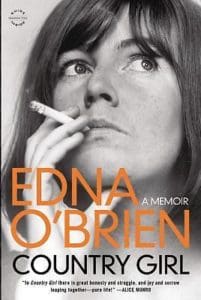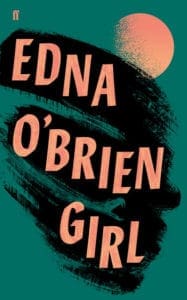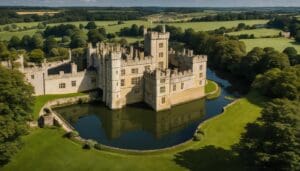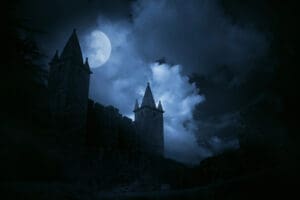Irish Author Edna O’Brien | A Controversial Writer

Updated On: November 07, 2023 by Ciaran Connolly
An international success, PEN Award winner, and an autobiographical author. Irish Author Edna O’Brien has lived and written about, an extraordinary life. She continues to shock, and please the world with her controversial, yet beautiful writing. The former Irish President Mary Robinson once hailed O’Brien as “One of the greatest writers of her generation”.
Continue reading to learn about the life and literary work of renown Irish novelist Edna O’Brien.
Edna O’Brien Short Biography
Josephine Edna O’Brien was born on 15 December 1930 in Tuamgraney, County Clare. She was the youngest child, and she described her family home as being strict and religious. As a girl, she was educated by the Sisters of Mercy, a Roman Catholic educational institution. She hated her time here and rebelled against it and released this in an interview: “Religion. You see, I rebelled against the coercive and stifling religion into which I was born and bred. It was very frightening and all-pervasive.” Due to her, what she described as, “suffocating” childhood, Edna O’Brien found inspiration for her writing, making her a worldwide success.
As a young adult, Edna married the Irish writer Ernest Gebler in 1954, and moved to London with her husband. The marriage ended in 1964, however, the pair had two sons: Carlo and Sasha.
Inspiration for Becoming a Writer
While in London Edna O’Brien read T.S. Elliot’s “Introducing James Joyce“, when reading this she learned that Joyce’s “A Portrait of the Artist as a Young Man” was an autobiographical novel. It was learning this that made her realise that she wanted to write, and use her life as inspiration.
After this, she published her first book in 1960 called “The Country Girls”. This became the first in her trilogy, the second novel is “The Lonely Girl”, and the third “Girls in their Married Bliss”. This trilogy became banned in Ireland for their intimate portrayals of the sex lives of her characters. In 1970 she wrote a novel based on her restrictive childhood called “A Pagan Place”. Her love for James Joyce is shown in her quote:
Edna O’Brien Books
Throughout Edna O’Brien’s career as a writer, she has written: 19 novels, 9 short story collections, 6 dramas, 6 non-fiction books, 3 Children’s books, and 2 poetry collections.
You can find her entire list of books here.
Edna O’Brien’s Sister Imelda
Edna O’Brien wrote many short stories for The New Yorker. One of her most well-known pieces was entitled “Sister Imelda”. It was released in the 9 November 1981 issue, and it was re-released in her collection of short stories called “The Love Object: Selected Stories”. Like many of her other pieces, “Sister Imelda” explores female sexuality. This short story is set in a convent, a young female in the convent falls for one of the nuns, Sister Imelda.
Their love is secret and contained in only notes, and the occasional kiss. Their love makes their lives within the convent bearable, and even enjoyable. In an attempt to continue their love, Sister Imelda gets the young student a permanent position in the convent. The young girl, the narrator, tells of how she decides not to take this offer. After leaving the convent, communication between the two gradually lessens until she almost completely forgets about Sister Imelda, and how she impacted her. She, along with her best friend Baba, have a mutual interest in makeup, and attempting to attract men.
Throughout the story, Edna O’Brien shows aspects of the childhood she despised. The semi-starvation of the students and nuns compared to the richness of the church is referenced, and the tarts show the forbidden sexuality of females. The nuns’ gestures of prostration is a symbol of Irish female suffering, and the story ends with the narrator’s pity for Imelda and the fellow nuns as she comes to the realisation of the common suffering of women.
Sister Imelda Characters:
Sister Imelda was a young nun and teacher within the convent
Narrator: a teenage student within the convent
Baba was the narrators best friend and a fellow student in the convent
Mother Superior was the rector in the convent
Edna O’Brien’s A Pagan Place
A Pagan Place was published in 1970 as a novel, and in 1972 was adapted to stage. The novel is narrated in the second person and is delivered in the form of a monologue. The narrators tell us about a girl growing up in Ireland in the 1930s- 1940s. The novel portrays her life within Ireland, which is shown as both wonderful and terrible. It follows her life from childhood to adulthood, it also mentions occurrences outside of Ireland: Hitler, and Winston Churchhill.
The novel contains many references to Catholicism, the child had her First Holy Communion and feared the Devil on many occasions. It emphases how religion is routinely woven into everyone’s lives. Likewise, she covers the idea that sex is sinful, and you should have feelings of guilt. All of these themes come from Edna O’Brien’s life growing up in Ireland.
“Glory be to the father… like the full stop at the of the words”
The protagonist’s sister, Emma, is presented as her polar opposite. She falls pregnant and is sent to Dublin to have the illegitimate child adopted.
Edna O’Brien’s Country Girl

Sourced: Flickr, Casto Matanzo
“Country Girl” is the memoir of Edna O’Brien, published in 2012. The title refers back to O’Brien’s first novel “The Country Girls” which was banned and burned by the priest of her local parish. This memoir takes us on the life of Edna O’Brien, showing the inspiration her life gave for her books. We are shown, in detail, her birth, marriage, single parenthood, and partying. We are also introduced to the people O’Brien encountered through her life: Hilary Clinton, and Jackie Onassis, on her many trips to America.
The cover of this memoir is a reprint of her 1965 novel “August Is A Wicked Month”, and it won the Irish Non-Fiction Award at the 2012 Irish Book Awards.
“Books everywhere. On the shelves and on the small space above the rows of books and all along the floor and under chairs, books that I have read, books that I have not read.”
“I had not the heart to tell her that great love stories told of the pain and separateness between men and women.”
“It is impossible to capture the essence of love in writing, only its symptoms remain, the erotic absorption, the huge disparity between the times together and the times apart, the sense of being excluded.”
Girl

Sourced: Faber & Faber
Edna O’Brien’s latest novel was released on the 5th September 2019, entitled “Girl”. It has already received a wide amount of support already, along with many positive reviews and most likely will be the last novel written by Edna at a remarkable 88 years old.
This novel is a harrowing tale about the abduction of women by Boko Haram. It is set in northeast Nigeria, it is both horrifying, and beautifully told! The girl referred to in the title is called Maryam, and we follow her journey as she is abducted from her school, married to the Boko Haram, having a child, and escaping with her child.
You can buy Edna O’Brien’s latest novel here on Amazon.
“Edna O’Brien’s nineteenth novel depicts the trauma which Nigerian schoolgirls faced when ambushed and captured by Boko Haram militants. This raw account of a young girl’s captivity and escape is nothing short of heartbreaking”. – Orlagh Doherty, RTE
Edna O’Brien Awards
Throughout O’Brien’s literary career, she has received many notable awards. She was also made a professor of English Literature in University College Dublin in 2006. While here, in the same year she was awarded the Ulysses Medal. She was also the 2001 Irish Pen Award winner. She has created such an impact on the world of literature that RTE aired a documentary about her in 2012.
Finally, on 10 April 2018, she was appointed an honorary Dame of the Order of the British Empire for her contributions to Literature. We have listed chronologically all the awards Irish author Edna O’Brien won for her literary work:
- “The Country Girls” won the 1962 Kingsley Amis Award
- “A Pagan Place” won the 1970 Book of the Year from the Yorkshire Post Book Awards
- “Lantern Slides” won the 1990 Los Angeles Book Prize for Fiction
- “Girl with Green Eyes” won the 1991 Italian Premio Ginzane Cavour
- “Time and Tide” won the 1993 Writers’ Guild Award for Best Fiction
- “House of Splendid Isolation” won the 1995 European Prize for Literature
- 2001 Irish Pen Award
- 2006 Ulysses Medal from University College Dublin
- 2009 Bob Hughes Lifetime Achievement Award in Irish Literature
- In 2010 “In the Forest” was shortlisted for Irish Book of the Decade in the Irish Book Awards
- “Saints and Sinners” was awarded the 2011 Frank O’Connor International Short Story Award
- “Country Girl”, Edna O’Brien’s Memoir won the 2012 Irish Book Award for Non-Fiction
- In 2018 she won the PEN/ Nabokov Award for Achievement in International Literature
The Irish Author’s Legacy
Throughout all the decades that we have delighted in Edna O’Brien’s forward-thinking and controversial writing, she has become well known across the world. Philip Roth described her as: “The most gifted woman now writing in English”. Eimear McBride described her as “not only giving voice to the voiceless but also washing Ireland’s dirty laundry in public” and that she “fell in love with the deep, beautiful humanity of her prose”.
Edna O’Brien Quotes
“It is increasingly clear that the fate of the universe will come to depend more and more on individuals as the bungling of bureaucracy permeates every corner of our existence”
“History is said to be written by the victors. Fiction, by contrast, is largely the work of injured bystanders”
“Ordinary Life bypassed me, but i also bypassed it. It couldn’t have been any other way. Conventional life and conventional people are not for me”
“I did not sleep. I never do when i am over-happy, or over-unhappy, or in bed with a strange man”
“The Vote means nothing to women, We should be armed”
“I Always want to be in love, always. Its like being a tuning fork”
Fun Facts
- Edna O’Brien’s parents were Michael O’Brien and Lena Cleary
- In 1979 she was a panel member of the first edition of BBC’s “Question Time”, then in 2017 she became, and is still the sole surviving member.
- In 1950 she was awarded a license as a pharmacist
Have you read any of Edna O’Brien’s literary works? Let us know in the comments below!
If you enjoyed learning about this Irish Author, please enjoy more of our blogs about famous Irish authors:
Famous Irish Authors Who Helped Promote Irish Tourism | Bram Stoker: Gothic Ireland and his famous Dracula | Irish Author: Cecelia Ahern – Book and Film Success | William Butler Yeats: A Poet’s Journey | Lady Gregory: An Often Overlooked Author | Irish Author Maria Edgeworth and her Life-Work | Successful Authors from Derry – James Burke & More | Brian Friel: His Life Work and Legacy






